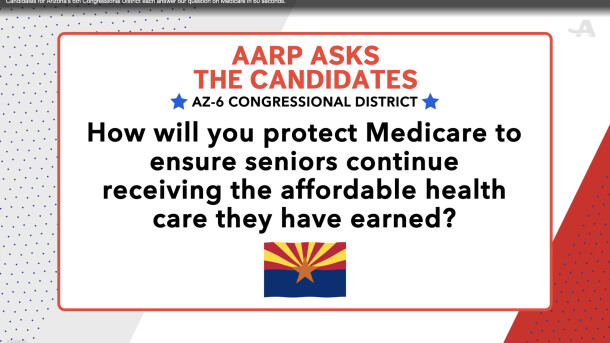AARP Hearing Center

The contest for Arizona’s 6th Congressional District is expected to be tight this year, as incumbent Rep. David Schweikert (R) squares off against Hiral Tipirneni, a physician based in the Phoenix area. To understand how they plan to protect Social Security and Medicare, stimulate the economy, lower prescription drug prices and ensure that Americans have access to affordable long-term care, AARP Maine asked each candidate to answer five key questions in 60-second videos. Here are their responses, with transcripts:
1. Social Security is a self-financed, off-budget program that half of all seniors rely on for more than 50 percent of their income. If elected, how will you ensure that current and future Social Security benefits are not cut as part of deficit reduction?

Schweikert: I’ve actually been on the Social Security subcommittee in [the House] Ways and Means [Committee]. The actual demographic revenue issues are actually very complicated. But the fact of the matter is, Social Security, Medicare are moral obligations and part of our social contract in this country. There’s a number of things we can do to shore it up, make it strong and make it permanent [so] that we know it’s there. Number one is economic expansion, and we saw an example in 2018 and 2019. We added years of life to Social Security because of that economic growth. We also need to add a number of other options for seniors that also would shore it up. There’s a number of these things — it’s complicated, but there’s a way to protect Social Security so it’s there for generations to come.
Tipirneni: Social Security is an earned benefit. Hardworking Americans have been paying into it their entire lives, and it’s part of the contract that they made with the government — that it would be there for them in their years of retirement. I will not allow there to be cuts in Social Security. We will protect these earned benefits as they deserve to be protected and make sure they’re not vulnerable to cuts — and certainly not to pay off deficits that are created by reckless, irresponsible corporate tax handouts.
2. On average, health care already accounts for $1 out of every $6 spent by seniors. If elected, how will you protect Medicare from benefit cuts, lower health care costs and ensure seniors continue receiving the affordable care they have earned?

Tipirneni: We must protect Medicare and all of its benefits. Seniors rely on this. This is their lifeline for health care, and they have paid into this. We have to make sure that it remains solvent. The way to do that is we have to reduce health care costs, because we know there’s a lot of waste in our health care system. With my experience as an emergency physician and understanding health care policy, I will work to reduce health care costs, to make sure that seniors continue to receive their full benefits and that it is entirely affordable.
Schweikert: Protecting Medicare is and will be the single biggest issue in Washington, D.C., for the next couple of decades. With our demographic bubble of baby boomers — I’m one of them — the fall in birth rates, the fall in number of workers, the math gets really difficult. Most folks don’t understand most of Medicare spending is a general-fund expenditure. It’s the largest in government. Turns out, there’s a number of things that are solutions. One is economic growth — so, revenues — and we actually saw that last year when we added years to the Medicare trust fund because of more workers. The other things we need to do are adding options for seniors. The success we’ve had during the pandemic with telemedicine — providing accessibility, but also we’re seeing some benefits on the cost curve. We need to keep adopting these types of changes that help us mitigate the costs. The last one is a piece of legislation I have to add more tax deductibility for seniors who end up having to spend their own resources.
3. Unemployment during the coronavirus crisis reached the highest levels since the Great Depression, and older Americans have been disproportionately affected. If elected, how will you help Americans over the age of 50 recover economically from the effects of the coronavirus?

Schweikert: This subject’s really important to me. I’ve spoken for years about my intense concern of what we call retirement security. And for so many of us, our work in our last 15 years before retirement is absolutely crucial. And now we see many of our brothers and sisters who are unemployed. Even today we’re working on language for a package to provide some stimulus for workers, particularly senior workers, to be able to open up their businesses, get back into the employment pools but also have that on-ramp so they can catch up in the funding of their retirement accounts — making sure they don’t hit this divot in their contributions to Social Security. It’s being focused on by those of us in the Ways and Means Committee, and we’re actually working out the math. It is worrisome, but there is a path to fix it.
Tipirneni: We have to be there to support the millions of Americans that have been hit so hard economically by this crisis — the public health crisis — as it continues to go on. We have to make sure there are resources that are helping these Americans. So that means we have to protect them from things like eviction — make sure there’s some moratorium on any evictions — make sure that they have the resources they need to pay their bills and keep their families afloat and make sure there’s a roof over their heads and food on the table. And we want to make sure their health care is protected, also. And that’s why it’s so important to not only protect health care benefits but also make sure that folks are able to afford those benefits and coverage, even if it’s not tethered to their employment status. So that’s why I’m working to make sure we have health care coverage for every single American that they can afford and that is quality, whether we are in a pandemic or not.
4. Americans pay the highest prescription drug prices in the world. If elected, how will you cut prescription drug prices for all Americans?

Tipirneni: We have to bring down the cost of prescription drugs in this country. We realize that millions of our fellow Americans are struggling every single day, rationing their medications or completely going without. This requires full transparency in pharmaceutical pricing. And we need to demand that from our pharmaceutical industry. That means understanding where our dollars are going, how much is going to the production of the drug, how much is going to research and development, how much is going to marketing and just corporate bonuses. And connected to this is understanding the corporate role of money in politics. We have to eliminate the outsized role of corporate money in politics to make sure that our elected officials are working for us and not their corporate donors.
Schweikert: Pharmaceutical pricing is actually one of my personal fixations, because how do you come up with a way where accessibility, price transparency and fair value — fair pricing — is available to us, while at the same time, we’re getting the next generation of the curatives? As you know, there’s a number of chronic conditions we’re on the cusp of curing. We now have the single-shot cure for hemophilia. And it turns out that there’s a handful of things we can do. It’s patent protection. It’s also the world where we, as Americans, are subsidizing Europe and the rest of the world in their pricing. We need to take that back. The other thing we can also do is [get] our tax policy proper and correct to incentivize those disruptive new pharmaceuticals that actually cure many of the chronic diseases, instead of keeping people on a maintenance for the rest of their lives.
5. COVID-19 has caused death and suffering for too many older Americans who require long-term care. If elected, how will you make sure seniors can access safe and affordable long-term care at home and in nursing homes and assisted living facilities?

Schweikert: The long-term care crisis that’s upon us and is coming in the near future — we actually need to do a much better job of coordinating federal resources with state resources. As you know, in Arizona, if you’ve also fallen into poverty, we have the ALTCS [Arizona Long-Term Care] System, where [we have] what we refer to as a dual eligible. Forty-five percent of the deaths from COVID in our country came from those in nursing home-type facilities. In Maricopa County, it was only 39 percent, but any number is unacceptable. The reality of it is, we’re going to have to think of how the financing mechanisms [work] and make them more robust. We’re also going to have to be more creative in providing options for those seniors that want to stay at home. How do we provide them their medicines to their door? How do we give them access to telemedicine? Are there things we can do so you don’t end up in a nursing home, but you can stay in a setting that you desire?
Tipirneni: It’s incredibly sad when we think about how our most vulnerable populations have been impacted by this pandemic. And, certainly, our seniors have been right at the top of that list. Along with their possible prior chronic illnesses, they have been affected by this virus far and wide. And it is important to realize that some of them may have long-term complications. This means that we have to protect not just their Medicare and their full Medicare benefits, but we also have to make sure Medicaid is fully funded and protected. Because a lot of that funding also helps to provide support for long-term care facilities, extended-care facilities, nursing support, as well as other needs that they might need as they rehabilitate and recover.
AARP is committed to ensuring voters have the information they need to cast their ballot this year. That is why we are publishing the AARP Asks the Candidates voter guide series, so candidates can share their plans on issues important to 50-plus voters.
AARP has a proud 34-year history of non-partisan voter engagement and does not endorse or oppose candidates or make contributions to political campaigns or candidates.
Also of Interest































































